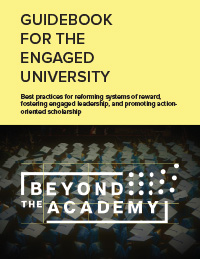Duke Experts Coauthor New Guide on Boosting Universities’ Impact ‘Beyond the Academy’
International group of scholars outlines best practices for creating a more ‘engaged university’
 Faculty and students are increasingly looking for ways to directly engage with the world’s most pressing environmental and social challenges, including climate change, the ongoing effects of a global pandemic and racial injustice. In a newly published book, an international group of scholars—including some from Duke University—offers a “vision and a roadmap to a more impactful future” for higher education.
Faculty and students are increasingly looking for ways to directly engage with the world’s most pressing environmental and social challenges, including climate change, the ongoing effects of a global pandemic and racial injustice. In a newly published book, an international group of scholars—including some from Duke University—offers a “vision and a roadmap to a more impactful future” for higher education.
The Guidebook for the Engaged University highlights best practices to encourage scholarship that goes beyond the traditional university model to make a real-world impact. The guidebook organizes those practices around three main themes:
- Reforming academic incentive structures;
- Encouraging public engagement and co-production; and
- Preparing students to be sustainability leaders.
“With their diverse knowledge, skills and networks, colleges and universities can and should be front and center in helping to address societal challenges,” said guidebook contributor Lydia Olander, director of the Ecosystem Services Program at Duke’s Nicholas Institute for Energy, Environment & Sustainability. “In practice, they're too often disengaged or a step removed from the on-the-ground partnerships needed to work with communities, policy makers and corporations to solve these problems. The guidebook reimagines what an ‘engaged university’ could look like, shifting academic priorities to maximize impact.”
The guidebook was written and published by Beyond the Academy, a network of hundreds of sustainability researchers from universities in the United States, Canada and the United Kingdom. Formed in 2018 with funding from the National Academies Keck Futures Initiative, Beyond the Academy is focused on making universities more supportive of applied interdisciplinary research.
Over the last three years, the network has hosted workshops, conducted literature reviews and collected case studies to identify innovative ideas for how universities can reform their systems and structures to promote action-oriented research. The discussions placed an emphasis on producing graduates prepared to make an immediate difference.
“Graduate students want curricula and research opportunities that provide an opportunity to have a practical effect on issues that touch all our lives,” said Edgar Virgüez, a 2022 Duke Ph.D. graduate who participated in the guidebook process and recently wrote about his perspective as an early-career scholar. “Working with Beyond the Academy showed the breadth of opportunities that forward-thinking universities, such as Duke, are already providing.”

The guidebook provides numerous examples from Duke and other institutions to show how universities can adapt their approaches.
A section on engagement leadership spotlights Duke’s Nicholas Institute for Environmental Policy Solutions, now known as the Nicholas Institute for Energy, Environment & Sustainability. Since 2005, the institute has acted as a bridge between Duke scholarship and the policy-making world. It delivers timely, nonpartisan analyses to decision makers and convenes key stakeholders to help address environmental challenges.
Bass Connections is another Duke program recognized in the guidebook for a structure and culture that supports engaged scholarship. Bass Connections brings together interdisciplinary teams of students and faculty to co-investigate complex societal problems.
The guidebook also cites DukeEngage as an example of a program that trains students interested in more engaged scholarship. During this immersive summer experience, students and faculty collaborate with communities—both locally and globally—to address critical social issues.
“Vibrant community partnerships require much more of researchers than just looking for a field site; you have to build relationships, which doesn’t easily map onto the incentive structure embedded in many universities,” said Edward Balleisen, Duke University vice provost for interdisciplinary studies. “The guidebook offers a set of practical tools that institutions can use to facilitate this highly collaborative work and credit scholars in their individual career trajectories. As the many examples in the guidebook illustrate, Duke has—and will continue to be—a leader in this crucial mode of equitable, applied, interdisciplinary research.”
The guidebook’s publication coincides with the announcement of the Duke Climate Commitment, which unites the university’s education, research, operations and public service missions to address the climate crisis. The commitment—to be formally introduced on Sept. 29—builds on Duke’s longstanding leadership in climate, energy and sustainability to educate a new generation of climate-fluent innovators and create equitable solutions for all.


